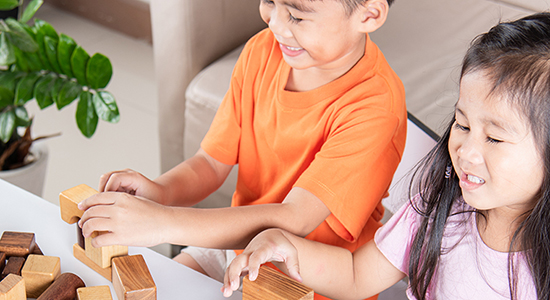‘Play is the work of a child’. – Maria Montessori.
‘Play is the highest form of research’. – Albert Einstein.
There is copious research about the importance of play in children’s lives. Play is now considered to be so important and essential for children’s development that it has been recognised by the high commission for human rights as the right of the child. This reinforces the value placed on ‘play’ both here in Australia and internationally.
Some ways that young children benefit through play are:
- Developing secure attachments: Through play children begin to foster secure attachments with their peers, families and educators. Strong relationships are the key to children feeling safe, secure and supported, which impacts learning, happiness and self-esteem.
- Brain development: The different types of play that children naturally engage in complement each other well to provide them with a rich mix of cognitive, motor and language development opportunities. Play has intellectual and cognitive benefits for the brain and it is believed to shape the structural development of the brain.
- Connection and communication: Play provides wonderful opportunities for children, educators and families to connect with and enjoy each other’s company. Play provides meaningful ways for children to communicate their ideas, thoughts and worries in a safe environment. Often young children lack the language to fully explain these thoughts and feelings, yet the theme will be prominent in their play. During play children are watching, listening exploring and imitating. Even when your child is playing silently they are learning important information and are exposed to new vocabulary.
- Social Skills: When engaging with and playing with other children and peers, children practice important pro social skills, such as, sharing, turn taking, fairness, leadership and teamwork.
- Developing life and learning skills: Through play children develop important learning and life skills such as exploring, investigating, identifying, negotiation, risk taking and imagination.
- Competence and Self-Esteem: problem solving and mastery. During play, children are provided with opportunities to practice various skills and tasks and act out situations or scenarios that may be on their minds or that they wish to improve on and master. In turn these skills will aid in regulating their behavior and emotions.
- Relaxation and fun: Amongst all of its benefits, Play is also relaxing and fun. It is truly a joy of childhood.
‘Play is the highest expression of human development in childhood, for it alone is free expression of what is in a child’s soul.’ – Friedrich Forebel.
‘Children learn as they play. More importantly, in play, children learn how to learn.’ – Fred Donaldson.







